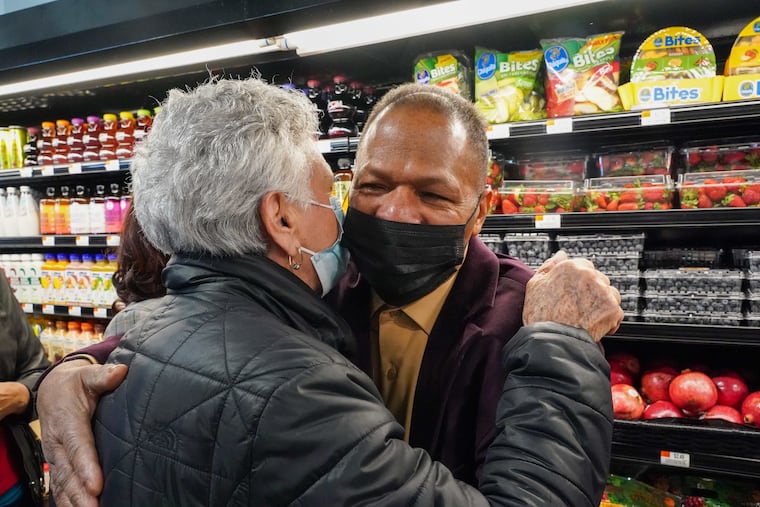Juniata Park’s new supermarket is proof of Latino growth and prosperity in the Philadelphia region
The new 40,000 square-foot facility on the 900 block of East Luzerne Street used to be an abandoned warehouse.

José Gómez broke into tears when he delivered his remarks at the grand opening of Juniata Supermarket’s second store location this week.
“Thanks to our neighborhood, to our people, we are here today,” Gómez, 70, said Wednesday. “As long as I’m alive and leading this effort, I’ve promised to God that this business will be for the benefit of the neighborhood.”
In 2004, the Dominican immigrant opened his first store at Juniata Park’s 1054 E. Lycoming St. with his business partner Ray Cabral, his wife’s brother-in-law. After spending three years on the new project, Juniata Supermarket on Wednesday opened its second store, a 40,000 square-foot facility, at 901 E. Luzerne St. in the North Philly neighborhood.
The new business is another success story that highlights the growth and prosperity of Latinos in the Philadelphia region and throughout Pennsylvania.
Jennifer Rodríguez, president and CEO for the Greater Philadelphia Hispanic Chamber of Commerce, said the achievement speaks to the perseverance of Latino and immigrant entrepreneurs in the city and positions Gómez within a small group of business owners: Only 4% of Latino-owned businesses in the region employ salaried workers other than family members and close associates.
“As an engine and a catalyst, we should not underestimate this,” Rodríguez emphasized. “He is contributing significantly.”
Juniata Park is home to immigrants from Vietnam, Puerto Rico, Mexico, Cambodia, Palestine, the Dominican Republic, and other countries. According to 2019 census data, 58% of neighborhood residents identify as Hispanic and Latino.
Lenín Agudo, director for Widener University’s Small Business Development Center, said family-owned businesses and BIPOC entrepreneurs tend to incorporate cultural elements — such as music, products, cultural gestures, and customs — in their business practices and are more likely to advocate for local prosperity by hiring from the community. This, he said, makes the years-long effort a great contribution to the local and national economy by strengthening the neighborhood’s development.
Designed by architect David Yhuada, the new store has a 60-space parking lot, 11 registers including four for self-serve, aisle signage with LED lighting, and private security agents at the entrance and exit. SEPTA bus routes 89, 53, and 56 stop within a five-minute walk to the location.
Estrella Rodríguez, who lives at Fifth and Butler Streets, drove to the store on Wednesday for the opening. She said Juniata Supermarket is her favorite. She’s been a customer for more than a decade, since she moved to Philly from Puerto Rico, 21 years ago. The achievement had her full of joy.
“I’m so happy for us,” Rodríguez said. “There is nothing like being able to find your preferred food, in the hands of kind people, at such good prices.”
Other residents like Milly Wilmo, a Juniata Park resident, said the new spacious location helps disperse the vast clientele that sometimes crowds the smaller Lycoming Street store. Another Juniata Park resident hoped the new store would ease traffic near the old store.
The new store offers fresh produce, canned goods, and imported products from places like Puerto Rico and the Dominican Republic for Black and other Caribbean Latino customers in Juniata Park. The seven-day-a-week operation competes with other immigrant-owned stores like Cousin’s and 7 Brothers, and larger chains such as Shop Rite and Walmart.
State Rep. Danilo Burgos, who gave the welcoming remarks, said Gómez, his family, and staff help end food deserts in Philadelphia by filling the needs in the neighborhood.
Gómez said the store created 100 jobs that have gone to Latinos and other Black workers, who either live in the neighborhood or within the city. He invested $2.5 million of his own business earnings for the $6 million dollar project.
Rodríguez, with the Hispanic Chamber of Commerce, said most Latino entrepreneurs usecapital they obtain through family and friends to start and scale their businesses. This is mostly due to barriers they face to access flexible capital that fits their needs and to a lack of understanding of the role of debt among business owners.
Jimmy Durán, a Latino business expert who served as a financial adviser to Gómez and his associate, said the private investment included $3.5 million obtained in bank loans. He said the project becomes a precedent that guarantees future investments.
He said the achievement inspires other small-business owners and Latino entrepreneurs in Philadelphia to scale their profits while highlighting the community’s potential to possible capital investors and bankers.
“This accomplishment demonstrates to lenders that the [business] community exists, the consumers exist, and that we are worth the risk; they just have to be patient.”
Despite some challenges during the pandemic like difficulties bringing goods from abroad, Gómez said he will continue to earn the lowest possible profit in order to offer low prices to his customers. He said most are working-class families or individuals receiving some kind of public assistance.
Regarding inflation and employee shortages, Gómez said his team is relying on their new warehouse storage to stock as many items as possible ahead of price changes and looks forward to increasing wages to between $12 and $15 an hour to attract workers.
José Firpo Fernández, 31, has worked for five years at Juniata Supermarket, stocking the aisles. Even though he’s tried working for some competitors, he returns to work with Gómez.
“Each time I’ve left, I end up coming back, because the competitors only cared about the money. Here, I feel like I’m at home.”